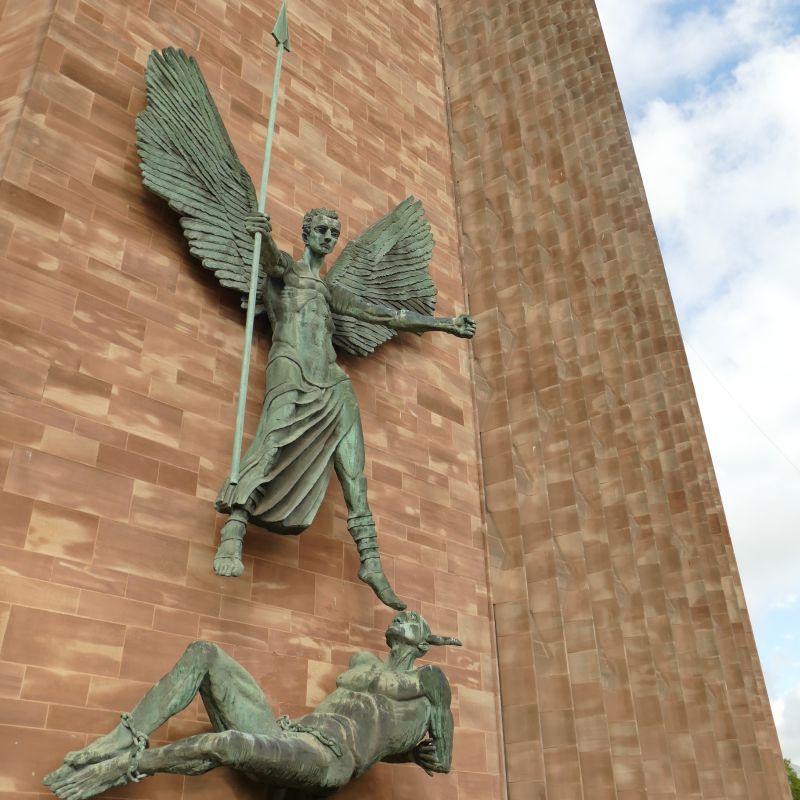
Cast in bronze by Jacob Epstein, 1959 for Coventry Cathedral
Photo (c) Stephen Craven
Today is Michaelmas, the feast of Saint Michael. Which is why I have chosen a hymn from the ‘Saints’ section of the hymnbook: ‘Thanks be to God for his saints’ by Timothy Dudley-Smith. Mind you, Michael is no ‘ordinary’ saint, he’s actually an Archangel, a created but eternal being. Best known for his appearance in the book of Daniel as the protector of God’s people, he also gets a brief mention in the books of Jude and Revelation, though no longer on the labels of a well known clothes brand of Jewish origin.
The hymn, though, or at least the first couple of lines, is more about the ‘ordinary’ saints, meaning not merely those who were specially canonised by the church as martyrs for their faith or allegedly responding to prayers addressed to them after their death, but the whole company of Christians who have passed over into eternal life. Whether or not they can actually answer prayers (and that’s a contested bit of Catholic theology) it is mainstream Christian faith that they are “one with us still in one body, one great congregation”.
The other verses aren’t really about the saints. The second thanks God for his daily blessings including the death and resurrection of Christ; the third, for our as yet unknown future in which Christ will keep us company, and the last for his calling and defence, not just of ‘special’ saints but of all who follow him.
We will have more opportunities to sing of the saints at the beginning of November.
As Stephen says, most of this hymn isn’t about saints, and the part which is – that they are “one with us still in one body, the great congregation” is not really the point: surely the point is that their example encourages us, but this doesn’t really get a mention in the hymn. I felt that Timothy Dudley-Smith had the feeling that he ought to write a hymn about saints but didn’t really find that he had much to say … and in a way, that is the whole point, because the saints point us to Jesus, and it is on him that our focus should rest.
The suggested tune is commonly used for “Praise to the Lord, the almighty, the King of creation” (by Joachim Neander, translated by Catherine Winkworth), and I found that there were constant elements of Timothy’s words that reminded me of Neander’s – so much so that by the end I wished I had been singing Neander’s instead. Maybe that simply means that Timothy’s hymn needs a different tune?
– – – –
About Michael and his angels, it is possible to sing hymns about them, but all of them have a faintly gory and bloodthirsty element about them, which is probably why “Sing Praise” didn’t include them. Daniel, Jude and Revelation are written for persecuted people, and not easily taken on board by those who aren’t undergoing sufferings, and the language and imagery is definitely on the edge … but I do feel there is a place for such things. Perhaps in Christian opera rather than Christian hymnody?
Nice photo, Stephen!
Re. the photo from Coventry Cathedral, I happened to be there last week for the Geograph AGM which included a guided tour of the city centre and a talk about its many urban artworks. We learnt two little-known things about the famous Epstein sculpture of Michael and the Devil: that the face is that of Epstein’s son-in-law Wynne Godley (check his entry on Wikipedia) and that if you look carefully from below the Devil is, as they say, well-hung.